八年级上册Unit1 复习课集体备课
人教版八年级英语上册unit1-unit10集体备课教案

1. Point to the picture on the screen. Say: Look at thepictures and the person. Find what the person do in eachpicture?
2. Play the recording the first time. Students write the pictures below the names.
2.Revisethe simple past tense and use“was”or“were”.
How was your weekend? It was great / OK /not bad…
What did you do on the weekend?
do my homework play soccer clean my room
(2). Now, please match each phrase with one of the pictures next to the name of the activity.
(3). Check the answers: 1. f 2. b 3. g 4. e 5. c 6. a 7. d
go to the beach play tennis go to the movies
visit my aunt stay at home have a party
do some reading practice English study for the test
Step 2. Presentation:
Section A1 (2a-2d)
课型
Listening&
八年级上第一单元备课
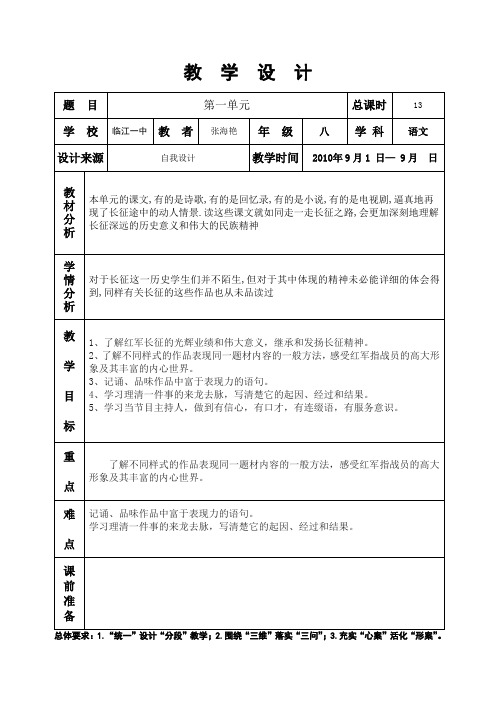
总体要求:1.“统一”设计“分段”教学;2.围绕“三维”落实“三问”;3.充实“心案”活化“形案”。
总体要求:1.“统一”设计“分段”教学;2.围绕“三维”落实“三问”;3.充实“心案”活化“形案”。
教学设计
总体要求:1.“统一”设计“分段”教学;2.围绕“三维”落实“三问”;3.充实“心案”活化“形案”。
教学设计
总体要求:1.“统一”设计“分段”教学;2.围绕“三维”落实“三问”;3.充实“心案”活化“形案”。
教学设计
总体要求:1.“统一”设计“分段”教学;2.围绕“三维”落实“三问”;3.充实“心案”活化“形案”。
教学设计
总体要求:1.“统一”设计“分段”教学;2.围绕“三维”落实“三问”;3.充实“心案”活化“形案”。
八上英语Unit1集体备课
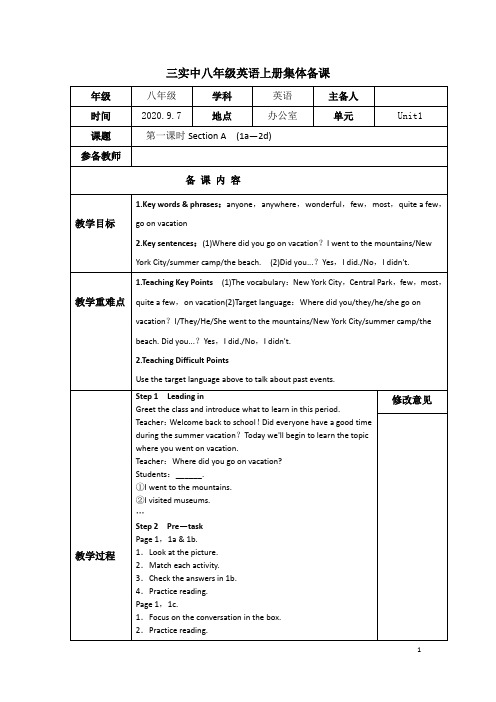
Use the target language above to talk about past events.
教学过程
Step 1Leading in
Greet the class and introduce what to learn in this period.
Step 4Post-task
Page 3,3c.
Complete the task in 3c.Ask your group questions about their last vacation. Then tell the class your results.
Step 5Homework
1.Review the indefinite pronouns learned in this period.
2.Key sentences:(1)Where did Lisa go on vacation?
(2)Did she do anything special there?Did she buy anything for her best friend?
Did Lisa like her vacation?(3)How was/were...?
3.Choose a student to give his or her answers. Write the answers on the board.
4.Correct the answers.
5.Lead students to read thients work in pairs and role-play the conversation. As they talk,move around the classroom monitoring their work. Offer language or pronunciation support as needed.
八年级英语上册集体备课 Unit1--4课时
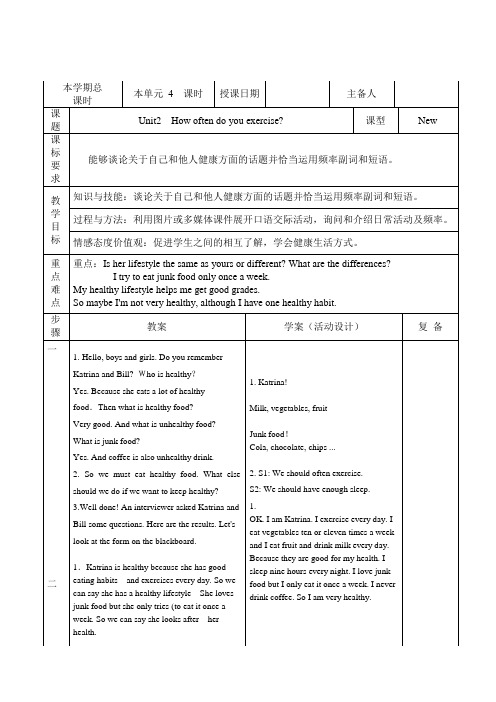
本学期总课时本单元 4 课时授课日期主备人课题Unit2 How often do you exercise? 课型New 课标要求能够谈论关于自己和他人健康方面的话题并恰当运用频率副词和短语。
教学目标知识与技能:谈论关于自己和他人健康方面的话题并恰当运用频率副词和短语。
过程与方法:利用图片或多媒体课件展开口语交际活动,询问和介绍日常活动及频率。
情感态度价值观:促进学生之间的相互了解,学会健康生活方式。
重点难点重点:Is her lifestyle the same as yours or different? What are the differences?I try to eat junk food only once a week.My healthy lifestyle helps me get good grades.So maybe I'm not very healthy, although I have one healthy habit.步骤教案学案(活动设计)复备一二1. Hello, boys and girls. Do you rememberKatrina and Bill? Who is healthy?Yes. Because she eats a lot of healthyfood.Then what is healthy food?Very good. And what is unhealthy food?What is junk food?Yes. And coffee is also unhealthy drink.2. So we must eat healthy food. What elseshould we do if we want to keep healthy?3.Well done! An interviewer asked Katrina andBill some questions. Here are the results. Let'slook at the form on the blackboard.1.Katrina is healthy because she has goodeating habits and exercises every day. So wecan say she has a healthy lifestyle She lovesjunk food but she only tries (to eat it once aweek. So we can say she looks after herhealth.1. Katrina!Milk, vegetables, fruitJunk food!Cola, chocolate, chips ...2. S1: We should often exercise.S2: We should have enough sleep.1.OK. I am Katrina. I exercise every day. Ieat vegetables ten or eleven times a weekand I eat fruit and drink milk every day.Because they are good for my health. Isleep nine hours every night. I love junkfood but I only eat it once a week. I neverdrink coffee. So I am very healthy.步骤教案学案(活动设计)复备三四I'm sure Katrina is energetic and studieswell. She must study better than Bill.2. let's read the new words together.3.This time S2 is Katrina. Tell us yourlifestyle. Try to use the words here. OK?Excellent! Let's give her/him a big hand.4.Now let's look at Bill. Is Bill the sameas Katrina? No. they are different.There are many differences betweenthem. I think Bill is kind of unhealthy.Read the new words after me.5. S5, Suppose you are Bill—Of course,I hope you are not—please tell us yourlifestyle.6. Now can you read all the new wordson the blackboard now? Try, please.Now I will ask some of you to read forus.1. Open your books and turn to page 5.Look at 3a. It's a letter from Katrina toher pen pal. Please read it aloudyourselves.2. S4, read it, please.3. Now let's answer the questions.a) How often does she exercise?b) How often does she drink milk?c) Does she eat junk food very often?d) Do you think she has a healthylifestyle? Why or why not?e) Is her lifestyle the same as yours ordifferent?What are the differences?1.Now let's do 3b. You may look at theform on the blackboard, or look at youranswers in 2b.2.Before we check the answers, can youtell me the new words you meet in theletter?Read after me.2. Read the words.3.S2: I am Katrina. I exercise every day.And I have good eating habits. I eatvegetables ten or eleven times a week andI eat fruit and drink milk every day. Isleep nine hours every night. Of course, Ilove junk food but I only eat it once aweek. I never drink coffee. So you cansee I have a healthy lifestyle. I look aftermy healthbecause I want to study better and getgood grades.4. Read words together.5. S5: I am Bill now. I hardly everexercise. I don't like eating fruit andvegetables. So I eat vegetables twice aweek and never eat fruit. I don't like milk,either. I love junk food so I eat it three orfour times a week. I love drinking coffee,too. I drink it four times a day. I am kindof unhealthy, but I have one healthylifestyle. I have enough sleep every night.I sleep nine hours a day.6. Try to read the words.1. Students try to read the text.2. S4 reads the letter.3.She exercises every day.She drinks milk every day.No, she doesn't.Yes. Because she exercises every day,eats healthy food and have enough sleep.It's different. I eat junk food every day.步骤教案学案(活动设计)复备五3.OK. Who can read it for us?Very good. Read it again, please.1.Now turn to page 81. Can you seethree questions here?S6, Read thequestions.2.Right. Now write down another fivequestions about health. Think of yourown questions.S2, would you like to read yourquestions?Excellent!Keep your own questions.Now you can ask three students thosequestions and take the notes. Let's begin!3. OK. Who did you interview,S6?Who do you think is the healthiest?Quite good.We've learned many new words today.Let's read them together.S6, read them again, please.1. 完成填空任务。
八年级语文上册第一单元复习教案(新版)新人教版

教具 学具 多媒体
学生活动
复习导入 整体感知 自学导航 激情互动 魅力精讲 拓展延伸
一、课前板书(一)本单元重点字词梳理归纳。 1、
惊骇 震悚 惶急 疮疤 孤孀 诘问 渴
慕 疏懒 霹雳
Hale Waihona Puke 2、交卸 奔丧 颓唐琐屑 3、尴尬 凹凼 烦躁 微不足道 4、伛
偻 惶恐 荒僻 塌败 取缔 骷髅
5、接济 长途跋涉 穷愁潦倒 风尘苦旅 克扣
鸡零狗碎
低眉顺眼
连声诺诺
生死
祸福
(学习方法指导:读写结合法)
(二)各课文学常识填空:
作家
字(原名)
时间
籍贯
课前板书重点生字词
组长组织批改
对于错误的地方学生
批改
教师重点强调
根据表格重点训练学
生的梳理课文的能力
根据表格填空
(小组合作完成,派
代表展示。)
学生自由复习本单元
基评础价知识
著作
鲁迅 豫才(周树人)
3、主题挖掘:作者塑造人物形象或撰写文章的目的
是什么?
板书设 计
(二)试结合以上方法复习本单元课文 1、以《信客》作为范例: (1)本文写了信客哪些事迹? (2)作者采取了什么描写方法写信客,从中可以看出 信客是一个怎么样的人? (3)“信客”这类职业在现代社会已不再存在,作者 塑造“信客”的目的是什么? 爱心故事大家讲。
第一单元复习
课 题 第一单元复习
备课人
课型
新授
课时
2
知 识 1、掌握课文中出现的重要字词。
与能
力
教 过 程 2、理清五篇课文的思想内容及其写作思路。 学 与方 目法 标 情 感 3、掌握阅读写人记叙文的方法,学会阅读一般的写人记叙文。
新八上英语第一单元集体备课教案

—No.No one was here, Everyone was on vacation.
3.—Did you buy anything special ?
—No.I bought nothing.
4.—How did you like it?
—No.No one was here, Everyone was on vacation.
2、能力目标:
能运用所学知识询问别人的旅游经历;听懂相关话题的对话;能正确运用一般过去时谈论过去发生的事情。
3、情感目标:
能够谈论自己的旅游经历,享受生活的乐趣。
二、教学重、难点:
能正确运用一般过去时谈论过去发生的事情。
科目【英语】年级【八年级】
课时【Period3】授课教师【】
主备人【樊迎春】参备人【马婧、蒋丽萍、马月萍、王凤花、
张大虎】
一、教学目标:
1、知识目标:
1)能掌握以下单词或短语:anyone,someone, everyone, no one,anything, something, nothing,everything, delicious, exciting, terrible, expensive, cheap, boring, great, friendly
(五)巩固新知
Do a surveylike 3c on page 3 in a group of four, then tell the class your results.
(六)课堂小结
要求学生掌握本不定代词的用法,及以下句型:
1.—Where did you go on vacation?
牛津译林版八年级上英语Unit1集体备课表格式教案
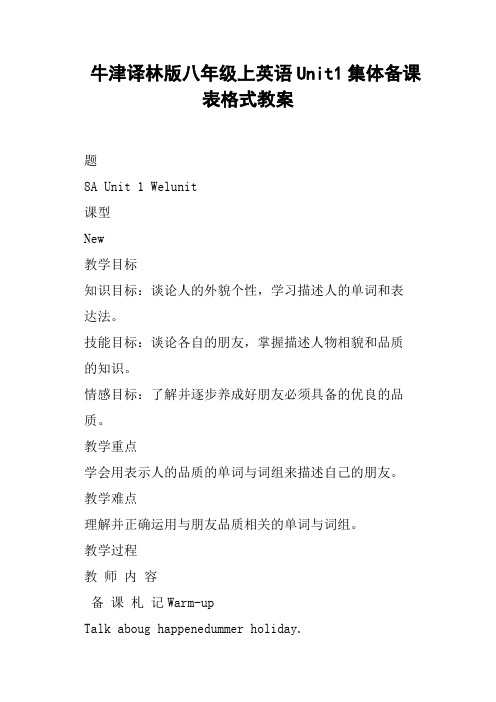
牛津译林版八年级上英语Unit1集体备课表格式教案题8A Unit 1 Welunit课型New教学目标知识目标:谈论人的外貌个性,学习描述人的单词和表达法。
技能目标:谈论各自的朋友,掌握描述人物相貌和品质的知识。
情感目标:了解并逐步养成好朋友必须具备的优良的品质。
教学重点学会用表示人的品质的单词与词组来描述自己的朋友。
教学难点理解并正确运用与朋友品质相关的单词与词组。
教学过程教师内容备课札记Warm-upTalk aboug happenedummer holiday.Showures and introdulaand animals in Australia. AlaTa photo wamous man--- Batman. He’s a hero and people’s good friend becaulps people in danger. Do you agree? What do you?Step 2 PresentationThere awords to describe people. For example, we can say Batman is good-looking. But we never say he’s beautiful! We don’t use beautiful to describe a boy or a man. Illl fuaappy, we saumorous.Teach “good-looking” and “humorous”Pr aPlay a guessing game.2. T: Just now we heardudents talk aboubds. Could you tell me which words are used?are vant quala bd, do you? Whaqualities aau?ay be used:Igood friend should be very … because…I agree. / I don’t agree with you because …It’s q important for a friend to be …? Do you?I don’good friend must be very …3. T: Why do you/ur bd? What makes him/al to you? Can you tal/her about anything? Do you tal/her when you have problems? Do you believe what he/she says? When you are haad, do you tal/her?Teach “sad”, “believe”, “honest” and“joy”PresentationT explalanguagT: How old is your bd? What about you? So you are teenagers. We call children between 13 andagers.Teach “teenager”.We have a good friend, Eddie. Is he a teenager? 2. Who’s Eddie’s goo d friend? Why?Play the taandd out the answqu(Hobo is Eddie’s good friend becaualways share things with ea) Audadand answer the questions:(1) What does Eddie give Hobo?(2) What does Hobo want?(3) Do youddie is a true friend? Why?T explalanguagummarizeDiscuss: Who do you like better as a friend, Eddie or Hobo? Why?A model dialogue:A: Who’s your good friend?B: …A: What’s he/she like?B: …A: What do youur friend?B: …A: What makes him/al to you?B: … Can you tellg about your good friend?T: Today we have learnedant qualities about a good friend. Iat we all think appearaant, but a friend should be helpful andAnd I hope evan be like that and you will havdHomework1. Describe a good friend of yours wwords and phrases lealesson.2. FWorkbook ex板书设计教学反思课题8A Unit 1 Friends Reading (1)课型New教学目标知识目标:进一步学习用形容词来描述朋友的外貌和个性。
八年级英语上册Unit1Wheredidyougoonvacation集体备课教案新版人教新目标版

八年级英语上册Unit1Wheredidyougoonvacation集体备课教案新版人教新目标版Where did you go on vacation一、教材分析本单元的核心话题是用一般过去时谈论度假等发生在过去的事情。
因此"Where did you g o on vacation?" " Did you go to the beach? Yes,I did.No,I didn't."等是教学的重点。
通过对本单元的学习,学生能掌握本单元出现的地点名词,用于询问和回答过去发生的事情的短语和句型。
采取任务型语言教学模式,融汇话题、交际功能和语言结构,形成了一套循序渐进的生活化的学习程序。
本单元列出明确的语言目标,主要的功能项目与语法结构,需要掌握的基本词汇,并分为A、B两部分。
A部分是基本的语言内容,包括词汇、语法、功能以及听力输入和口语输出为主要形式,是体验和感知语言的阶段。
B部分是在A的基础上对单元话题内容的进一步拓展,尤其是词汇的扩展和本部分在进一步听说训练的基础上,重点发展学生的阅读和写作能力。
B主要是语言的学习、巩固和运用阶段。
每个单元还有self check部分,供学生自我检测本单元所学的语言知识之用。
它采用"语言的输入--学生的消化吸收--学生的语言输出"为主线编排的。
通过确定language Goal,采用听、说、读、写,自我检测等手段,有效提高语言习得者的学习效率,有利于习得者的语言产出,体现了以学生为主体的思想。
二、学情分析本单元所讨论的内容与学生实际情况相符合,学生学起来有自己体验,更加生活化。
在引入的时候以及教学过程中要多从学生的角度思考,利用他们的这点新鲜感去挖掘他们的求知欲,引导学生积极参与回忆自己的假期时光,提高学生学习语言的主动性,教会学生用英语去表达自己的感情。
引导学生回忆美好过去并展望未来。
+Unit1+单元复习课教学设计 人教版八年级英语上册
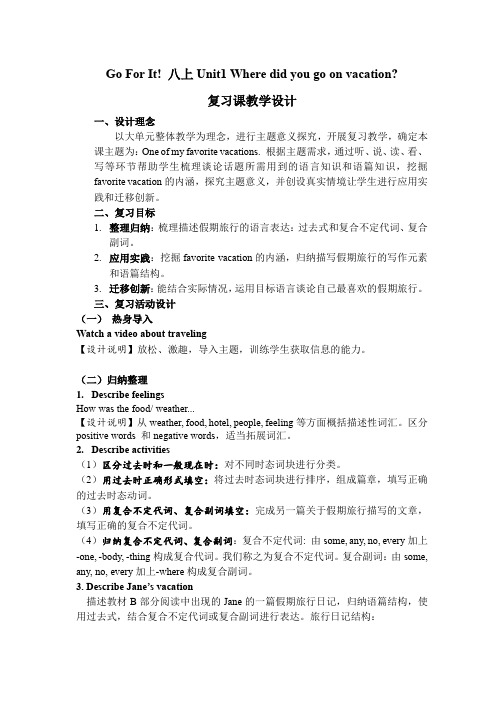
Go For It! 八上Unit1 Where did you go on vacation?复习课教学设计一、设计理念以大单元整体教学为理念,进行主题意义探究,开展复习教学,确定本课主题为:One of my favorite vacations. 根据主题需求,通过听、说、读、看、写等环节帮助学生梳理谈论话题所需用到的语言知识和语篇知识,挖掘favorite vacation的内涵,探究主题意义,并创设真实情境让学生进行应用实践和迁移创新。
二、复习目标1.整理归纳:梳理描述假期旅行的语言表达:过去式和复合不定代词、复合副词。
2.应用实践:挖掘favorite vacation的内涵,归纳描写假期旅行的写作元素和语篇结构。
3.迁移创新:能结合实际情况,运用目标语言谈论自己最喜欢的假期旅行。
三、复习活动设计(一)热身导入Watch a video about traveling【设计说明】放松、激趣,导入主题,训练学生获取信息的能力。
(二)归纳整理1.Describe feelingsHow was the food/ weather...【设计说明】从weather, food, hotel, people, feeling等方面概括描述性词汇。
区分positive words 和negative words,适当拓展词汇。
2.Describe activities(1)区分过去时和一般现在时:对不同时态词块进行分类。
(2)用过去时正确形式填空:将过去时态词块进行排序,组成篇章,填写正确的过去时态动词。
(3)用复合不定代词、复合副词填空:完成另一篇关于假期旅行描写的文章,填写正确的复合不定代词。
(4)归纳复合不定代词、复合副词:复合不定代词: 由some, any, no, every加上-one, -body, -thing构成复合代词。
我们称之为复合不定代词。
复合副词:由some, any, no, every加上-where构成复合副词。
八年级英语上册集体备课Unit1--1
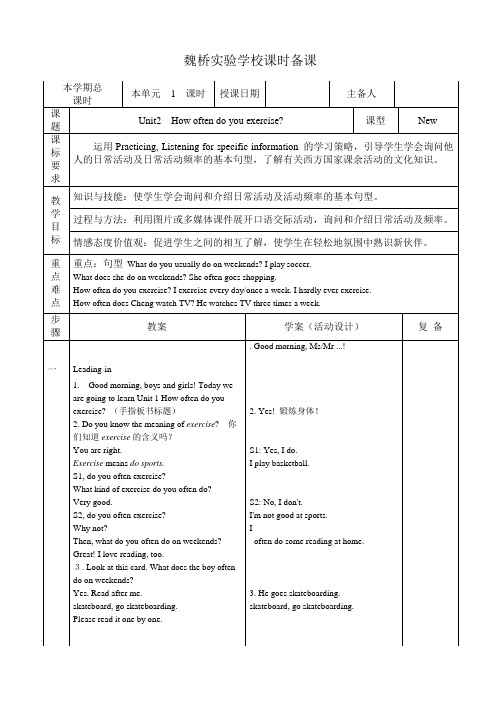
魏桥实验学校课时备课本学期总课时本单元 1 课时授课日期主备人课题Unit2 How often do you exercise? 课型New课标要求运用Practicing, Listening for specific information 的学习策略,引导学生学会询问他人的日常活动及日常活动频率的基本句型,了解有关西方国家课余活动的文化知识。
教学目标知识与技能:使学生学会询问和介绍日常活动及活动频率的基本句型。
过程与方法:利用图片或多媒体课件展开口语交际活动,询问和介绍日常活动及频率。
情感态度价值观:促进学生之间的相互了解,使学生在轻松地氛围中熟识新伙伴。
重点难点重点:句型What do you usually do on weekends? I play soccer.What does she do on weekends? She often goes shopping.How often do you exercise? I exercise every day/once a week. I hardly ever exercise. How often does Cheng watch TV? He watches TV three times a week.步骤教案学案(活动设计)复备一Leading-in1. Good morning, boys and girls! Today weare going to learn Unit 1 How often do youexercise? (手指板书标题)2. Do you know the meaning of exercise?你们知道exercise的含义吗?You are right.Exercise means do sports.S1, do you often exercise?What kind of exercise do you often do?Very good.S2, do you often exercise?Why not?Then, what do you often do on weekends?Great! I love reading, too.3. Look at this card. What does the boy oftendo on weekends?Yes. Read after me.skateboard, go skateboarding.Please read it one by one.. Good morning, Ms/Mr ...!2. Yes! 锻炼身体!S1: Yes, I do.I play basketball.S2: No, I don't.I'm not good at sports.Ioften do some reading at home.3. He goes skateboarding. skateboard, go skateboarding.步骤教案学案(活动设计)复备二三Practice1.Well done! Now please open yourtextbook and turn to page 1. Look at thepicture.Guess. What are the children doing, S1?A good guess. S2, what do you think?I think so. Now let’s do 1a. Look at thepicture. Make a list of the differentweekend activities.2.OK, let's check the answers. Please tellme the answers.Presentation1. Well done! Do you often go shopping,girls?What about boys?So you hardly ever go shopping, right?(老师手指着板书上的短语hardly ever)hardly 几乎不,几乎没有;ever 曾经hardly ever是几乎从不,几乎不曾的含义。
八年级英语上册Unit1-4集体备课教案
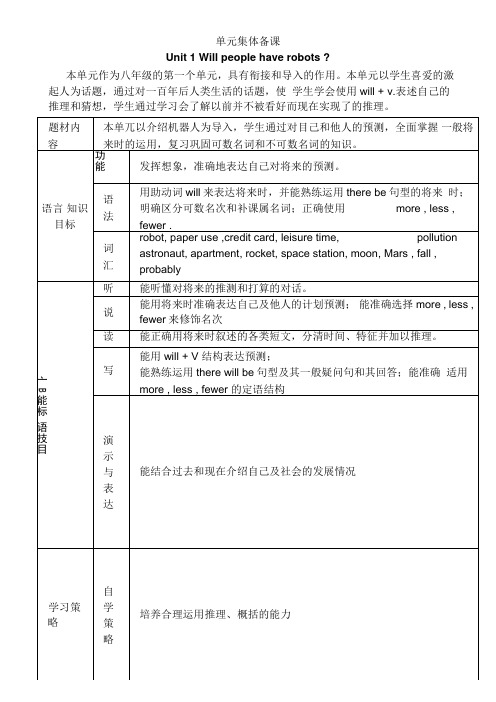
单元集体备课Unit 1 Will people have robots ?本单元作为八年级的第一个单元,具有衔接和导入的作用。
本单元以学生喜爱的激起人为话题,通过对一百年后人类生活的话题,使学生学会使用will + v.表述自己的推理和猜想,学生通过学习会了解以前并不被看好而现在实现了的推理。
Teaching goals:1. Words&phrases: robot, paper, less, fewer, simple, unpleasant, factory, seem, etc .2. will构成的一般将来时态的陈述句、否定句、疑问句及回答3. There be句型的一般将来时.4. more , less , fewer 的用法.5. 学习一般将来时态的相关知识,学会对未来进行预测6. 对five years ago ,today ,in five years简洁回顾与展望的方式,贴近实际符合学生心理,激发学习兴趣7. 通过时间对比复习一般过去时态、一般现在时态,巩固一般将来时Important and difficult points :1. will 构成一般将来时态的句式。
2. There be 句型的一般将来时态。
3. more , fewer , less 的用法。
4. How to make predictions .The first periodTeaching stepsStep 1 On the blackboard write a simple time line showing four dates: today? date ; a date exactly one year now; a date five years from now; and a date ten years from now.now in 1 year in 5 years In ten years| _______ | ______________ | ___________________ |Step 2 Point to the date “in a1nyde a rsk th”e studentsWhat will be different in your life one year from now?Will you be at this school in a year?Will you live in the same house in a year?Will you be in my class in a year?Repeat the same procedure with the dates 5 years and 10 years in the future. Ask other questions to help students think aheadWill you live in this town five years from now?Will you be in college?Will you have a college five from now?What job will you have ten years from now?Will you have children ten years from now?After the students? predictions, Underline the word “will ” in each one.Step 3 Introduce the key vocabulary and the idea of making predictions Then say, in this activity w e?re going to talk about more than five years or ten years in the future we?re going to talk about 100 years in the future.Step 4 Let students practise in understanding the target language in spoken conversationStep 5 Play the recording the first time. Students only listen then listen to the conversation againCircle the predictions they?re talking about on the recording and correct the answer.Writing design on the blackboardnow in 1 year in 5 years In ten yearsWhat will be different in your life one year from now?Will you be at this school in a year?Will you live in the same house in a year?Will you be in my class in a year?Will you live in this town five years from now?Will you be in college?Will you have a college five from now?What job will you have ten years from now?Will you have children ten years from now? 3)Homework 1 .Recite the new words2. Practise the conversation made in class.4)Summary afte teaching: T he students have learned to make predictionThe second period1) Teaching stepsStep 1 Revise the words and expressions and ask some students to make predictions in the future.Step 2 In 2a point out the list of predictions and ask different students to read thepredictions to the class. Read the predictions and point the sample answerStep 3 Play the recording . Students circle the word they hear on the recording in each sentence : more, less, fewer. Then check the answer.Then the students listen to the recording again and check the predictions they hear and check the answersStep 4 Grammer focus : ask the students to say the statements and reponses. Review the concept of countable and uncountable nouns by writing the two words on the blackboard and asking different students to come to the board and write example of each under the heading.Countable nouns uncountable nounseggs watercookies milkapples orange juicebananas meatStep 5 Point to the three pictures and say, this is Sally. This is Sally five years ago, this is Sally now, and this Sally five years in the future. Read the instructions and ask the students to complete the work on their own. Check the answers by calling on different students to make predictions about Sally.2)Writing design on the blackboard Countable nouns eggs cookies apples bananas3) Homework recite 3a4) Summary afte teaching: Thestudents have learned to make predictionThe third period1) Teaching stepsStep 1 Review making predictions about the future.Step 2 Teach: rocket ,astronaut , space station, computure programmer,crazy, live, moon, transportation, petAsk the students to say in their own words what each heading means. And write these words on the blackboard and using a simple drawing or a brief explanationto describe each one.Step 3 Listen to the recording of 2a. Students will hear three conversations. Decide which conversation goes with each picture. Write the number of each conversation next to one of the pictures. Play the recording a second time ,students number the pictures. Step 4 Listen and write using the target language. Write the correct words from the box on the blank lines.Step 5 Reading and writing (3a)First point to the paragraph and say: First read Li Ming?s answer. Then write down any questions you would like to ask about the story. We?ll answer these questions together. Ask students to complete the chart on their own and check the answers: Job: reportPets: parrot, many others Sports: skating swimmingPlace: Shanghai, Hong Kong, AustraliaClothes: smart clothes, to wear a suit (during the week); casual clothes(at the weekend) 2)Writing design on the blackboard Job: reportPets: parrot, many others Sports: skating swimmingPlace: Shanghai, Hong Kong, AustraliaClothes: smart clothes, to wear a suit (during the week); casual clothes(at the weekend) 3)Homework recite 3a4) Summary afte teaching: The students have learned to make predictionuncountable nouns water milk orangejuice meatThe fourth period1) Teaching stepsStep 1 for self check Ask students to fill in the blanks on their ownand check the answers.Step 2 Task1: Teacher: you all have your childhood. What did you do when you were young? Now y ou ,re middle school students, what do you often do in your school or at home? In some years you?ll leave school, what will you do in the future?I am a middle school student now.I?ll be a teacher ….in ….years. Classmates: He wasHe is a ........He?ll be ……Task 22008年奥运会时的我Fill in an application formAPPLICATION FORMStep 3 reading and comprehension:Reading strategy:1. Look at the title and picture and predict what you?ll read about.2. This helps you get ready to acquire new information.Find exmples of the following structures in the reading. Then make your own sentensces:….the same as …….make…do…….to take …time to do sth….to help do….to help with..2)writing design on the blackboardWork in groups eg: I was a little boy ....................... years agoI am a middle school student now.I?ll be a teacher ….in ….years. Classmates: He wasHe is a ........He?ll be ……3)Homework: 1. Write a composition to intreduce yourself.2. To fill in the form “2008 年奥运会时的我”4)S ummary afte teaching: The students have learned to make predictionUnit2 What should I do ?(预习课暨集体备课)单元教材分析学会should ,Why don?t you和could在英语中的习惯用法。
人教版八年级上第一单元单元集体备课
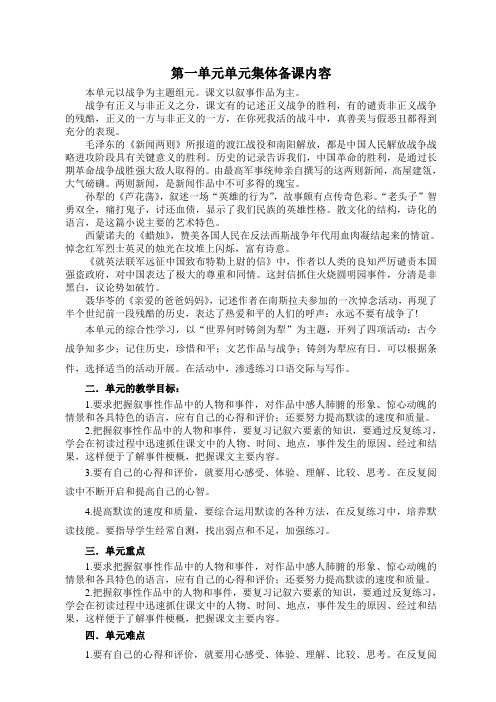
第一单元单元集体备课内容本单元以战争为主题组元。
课文以叙事作品为主。
战争有正义与非正义之分,课文有的记述正义战争的胜利,有的谴责非正义战争的残酷,正义的一方与非正义的一方,在你死我活的战斗中,真善美与假恶丑都得到充分的表现。
毛泽东的《新闻两则》所报道的渡江战役和南阳解放,都是中国人民解放战争战略进攻阶段具有关键意义的胜利。
历史的记录告诉我们,中国革命的胜利,是通过长期革命战争战胜强大敌人取得的。
由最高军事统帅亲自撰写的这两则新闻,高屋建瓴,大气磅礴。
两则新闻,是新闻作品中不可多得的瑰宝。
孙犁的《芦花荡》,叙述一场“英雄的行为”,故事颇有点传奇色彩。
“老头子”智勇双全,痛打鬼子,讨还血债,显示了我们民族的英雄性格。
散文化的结构,诗化的语言,是这篇小说主要的艺术特色。
西蒙诺夫的《蜡烛》,赞美各国人民在反法西斯战争年代用血肉凝结起来的情谊。
悼念红军烈士英灵的烛光在坟堆上闪烁,富有诗意。
《就英法联军远征中国致布特勒上尉的信》中,作者以人类的良知严厉谴责本国强盗政府,对中国表达了极大的尊重和同情。
这封信抓住火烧圆明园事件,分清是非黑白,议论势如破竹。
聂华苓的《亲爱的爸爸妈妈》,记述作者在南斯拉夫参加的一次悼念活动,再现了半个世纪前一段残酷的历史,表达了热爱和平的人们的呼声:永远不要有战争了!本单元的综合性学习,以“世界何时铸剑为犁”为主题,开列了四项活动:古今战争知多少;记住历史,珍惜和平;文艺作品与战争;铸剑为犁应有日。
可以根据条件,选择适当的活动开展。
在活动中,渗透练习口语交际与写作。
二.单元的教学目标:1.要求把握叙事性作品中的人物和事件,对作品中感人肺腑的形象、惊心动魄的情景和各具特色的语言,应有自己的心得和评价;还要努力提高默读的速度和质量。
2.把握叙事性作品中的人物和事件,要复习记叙六要素的知识,要通过反复练习,学会在初读过程中迅速抓住课文中的人物、时间、地点,事件发生的原因、经过和结果,这样便于了解事件梗概,把握课文主要内容。
初中八年级英语:Unit 1 复习教案

新修订初中阶段原创精品配套教材Unit 1 复习教案教材定制 / 提高课堂效率 /内容可修改Unit 1 review lesson plans教师:风老师风顺第二中学编订:FoonShion教育Unit 1 复习教案unit 1 复习教案1.teaching aimsreview to talk about what people are doing.review the present progressive tense and present tense.2. teaching importance: review the key words and the target language.ⅲ. teaching difficultiestrain students’ ability of communicative competence.train students’ integrating skills.ⅲ. teaching methodspairworkpracticing methodsⅲ. teaching aidsa computercardsⅲ. teaching proceduresstepⅲreview the target language1. talk about what people are doing. work in pairs. first one person asks the questions like this: what is she doing? what are they doing? what is he doing? and then the other person answers the questions.what is she doing?she is watching tv?what are they doing?they’re eating dinner.what is he doing?he’s reading.what is he doing?he’s cleaning.what is he doing?he’s doing homework.2. ask several students to say some of their questions and answers for the class.3. make a conversation. use the target language to make a conversation with your partner.what are you doing?i’m doing my homework.do you want to go swimming?yes, i do.at three o’clock.stepⅲ review the structuresyes/no questions and short answers. write as many as you can.ask several students to read their sentences.stepⅲ review the key vocabulary1. memorize the key words: watching, doing, eating, reading, cleaning, playing, swimming, shopping, pool, school, mall, library.2. have a dictation.stepⅲ summaryin this class, we’ve reviewed the key vocabulary and the present progressive tense.stepⅲ homeworkwrite something about what do you want to be in the future.blackboard designunit 5 i’m watching tv.what are you doing?i’m doing my homework.do you want to go swimming?yes, i do.at three o’clock.教学后记:FoonShion教育研究中心编制Prepared by foonshion Education Research Center。
人教版八年级语文上册unit1-unit10集体备课教案

人教版八年级语文上册unit1-unit10集体备课教案Unit 1 丰富多彩的语言世界本单元主要内容为语言与文字的关系、写信和表达感受等。
第一课《语言与文字》教学目标:- 了解语言与文字的关系及其作用;- 研究并掌握本课的核心词汇和表达方式;- 通过写信表达感受,培养学生的写作能力。
教学重点:- 理解语言与文字的关系;- 研究核心词汇的拼写和用法;- 运用所学知识写信表达感受。
教学准备:- 教材及教辅资料;- 黑板、彩笔等辅助教具。
教学过程:1. 热身导入:让学生观察一幅画面,讨论画面中人物可能说的话。
2. 导入新知:通过示意图解释语言和文字的关系,引导学生思考两者的作用。
3. 研究课文:带领学生齐读课文,理解其中的重点内容。
4. 讨论研究:学生分组讨论,总结语言和文字的作用,并展示自己的理解。
5. 练巩固:学生根据所学内容写一封信,表达自己的感受。
6. 总结复:回顾课堂重点内容,并为下一课做铺垫。
第二课《写意》教学目标:- 了解中国扇画的特点和起源;- 研究扇子的部件名称;- 培养学生欣赏和绘画的能力。
教学重点:- 理解中国扇画的特点和起源;- 研究扇子的部件名称;- 欣赏和绘画中国扇画。
教学准备:- 扇子样本;- 彩色纸、彩笔等绘画工具。
教学过程:1. 热身导入:学生观察一幅扇子绘画并描述其中的内容和特点。
2. 导入新知:向学生介绍中国扇画的起源和特点。
3. 研究课文:带领学生齐读课文,理解其中的关键内容。
4. 研究扇子部件:使用扇子样本,教授扇子的部件名称。
5. 绘画实践:学生使用彩色纸和彩笔,尝试绘制自己的扇子画。
6. 欣赏分享:学生展示自己的作品并互相欣赏。
...(继续编写其他单元的教案,直到编写完所有单元的教案)。
【精品】八年级语文上册第一单元复习教案1新人教版word版
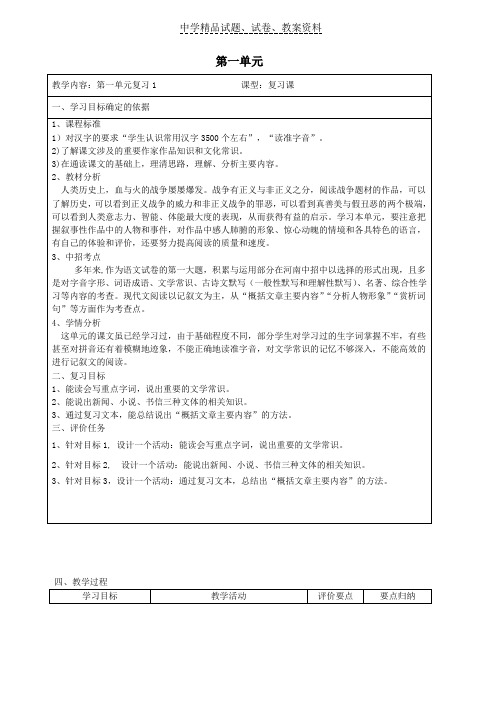
_______,现代______家、散文家,本
文是他的“白洋淀纪事之二”,另一篇
小说《________》,被视为“________
派”的主要代表作。
2.《蜡烛》是_______(国籍)作家
________写的一篇战地通讯。
3.雨果,(1802-1885),_____国作家。
法国_______文学的重要代表。其代表
________是必不可少的三部分。
________是消息内容的提要,除了正题
之外,还可以在前面加________或在后
2、能说出新闻、小说、 面加________。________部分简明的报 通过学生
书信三种文体的相关知 道概括的事实或中心。_______部分要
自行快速背
识。
具体展开事实或进一步突出中心。
中学精品试题、试卷、教案资料
第一单元
教学内容:第一单元复习 1
课型:复习课
一、学习目标确定的依据
1、课程标准 1)对汉字的要求“学生认识常用汉字 3500 个左右”,“读准字音”。 2)了解课文涉及的重要作家作品知识和文化常识。 3)在通读课文的基础上,理清思路,理解、分析主要内容。 2、教材分析
人类历史上,血与火的战争屡屡爆发。战争有正义与非正义之分,阅读战争题材的作品,可以 了解历史,可以看到正义战争的威力和非正义战争的罪恶,可以看到真善美与假丑恶的两个极端, 可以看到人类意志力、智能、体能最大度的表现,从而获得有益的启示。学习本单元,要注意把 握叙事性作品中的人物和事件,对作品中感人肺腑的形象、惊心动魄的情境和各具特色的语言, 有自己的体验和评价,还要努力提高阅读的质量和速度。 3、中招考点
月明风清 眼花缭乱 片纸只字
转弯抹角 不可名状
人教版八年级英语上册unit1复习教案
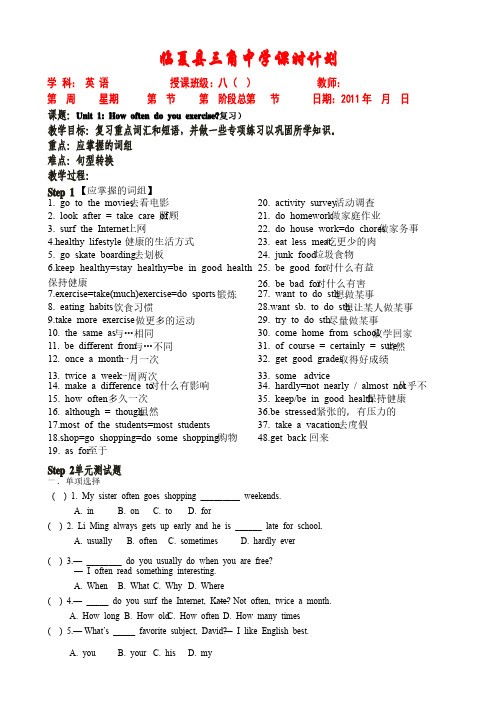
临夏县三角中学课时计划学 科: 英 语 授课班级:八( ) 教师:第 周 星期 第 节 第 阶段总第 节 日期:2011年 月 日 课题:Unit 1: How often do you exercise? (复习)教学目标:复习重点词汇和短语,并做一些专项练习以巩固所学知识。
重点:应掌握的词组难点:句型转换教学过程:Step 1 【应掌握的词组】【应掌握的词组】1. go to the movies 去看电影去看电影2. look after = take care of 照顾照顾3. surf the Internet 上网上网4.healthy lifestyle 健康的生活方式健康的生活方式5. go skate boarding 去划板去划板6.keep healthy=stay healthy=be in good health 保持健康保持健康7.exercise=take(much)exercise=do sports 锻炼锻炼8. eating habits 饮食习惯饮食习惯饮食习惯9.take more exercise 做更多的运动做更多的运动做更多的运动 10. the same as 与…相同与…相同 11. be different from 与…不同与…不同 12. once a month 一月一次一月一次一月一次 13. twice a week 一周两次一周两次一周两次 14. make a difference to 对什么有影响对什么有影响 15. how often 多久一次多久一次多久一次 16. although = though 虽然虽然虽然 17.most of the students=most students 18.shop=go shopping=do some shopping 购物购物 19. as for 至于至于20. activity survey 活动调查活动调查21. do homework 做家庭作业做家庭作业22. do house work=do chores 做家务事做家务事23. eat less meat 吃更少的肉吃更少的肉24. junk food 垃圾食物垃圾食物25. be good for 对什么有益对什么有益 26. be bad for 对什么有害对什么有害 27. want to do sth .想做某事想做某事28.want sb. to do sth.想让某人做某事想让某人做某事29. try to do sth. 尽量做某事尽量做某事30. come home from school 放学回家放学回家31. of course = certainly = sure 当然当然32. get good grades 取得好成绩取得好成绩取得好成绩 33. some advice 34. hardly=not nearly / almost not 几乎不几乎不35. keep/be in good health 保持健康保持健康36.be stressed 紧张的,有压力的紧张的,有压力的37. take a vacation 去度假去度假48.get back 回来回来Step 2单元测试题 一.单项选择一.单项选择( ) 1. My sister often goes shopping _________ weekends. A. in B. on C. to D. for ( ) 2. Li Ming always gets up early and he is ______ late for school. A. usually B. often C. sometimes D. hardly ever ( ) 3. — ________ do you usually do when you are free? — I often read something interesting. A. When B. What B. What C. Why C. Why D. Where ( ) 4. — _____ do you surf the Internet, Kate? — Not often, twice a month. A. How long B. How old C. How often C. How often D. How many times D. How many times ( ) 5. — What’s _____ favorite subject, David? — I like English best. A. you B. your C. his D. my ( ) 6. “75% of the students watch TV every day” means _____ students like watching TV . A. all B. some B. some C. most C. most D. no ( ) 7. _________ soccer, many boys play soccer once a week. A. To B. For C. As for D. As ( ) 8. My brother likes fruit a lot and he eats it three___ four times every week. A. and B. but C. or D. go ( ) 9. You can ’t keep birds in cages (笼子). It ’s good ___ them __ in the sky. A. for; fly B. for; to fly C. of; to fly D. of; fly ( ) 10. — ___ hours do you sleep every night? — About nine hours. A. How long B. How often C. How much D. How many ( )11. — Do you often eat junk food? — No, my mother ______ me to eat too much. A. wants B. doesn’t want C. lets D. doesn’t let ( ) 12. — Why do you eat vegetables and fruit every day?— Because they help me _______. A. keeping health B. keep health C. keep in good health D. keeping healthy ( ) 13. John has ______ lifestyle _______ me. We both like fruit and vegetables. A. different; as B. different; from C. the same; as D. same; with ( ) 14. My sister is very healthy because she often _______. A. reads B. sleeps C. exercises D. shops ( ) 15. You are too fat. You must _________ eat _____ meat. A. try; more B. try to; more C. try to; less C. try to; less D. try; less D. try; less 二.二. 根据要求转换句型。
- 1、下载文档前请自行甄别文档内容的完整性,平台不提供额外的编辑、内容补充、找答案等附加服务。
- 2、"仅部分预览"的文档,不可在线预览部分如存在完整性等问题,可反馈申请退款(可完整预览的文档不适用该条件!)。
- 3、如文档侵犯您的权益,请联系客服反馈,我们会尽快为您处理(人工客服工作时间:9:00-18:30)。
6.我们应该向他们说什么? What should I say to him? 7.他们总是把自己的孩子与其他孩子进行比较。 They are always comparing their kids with other children. 8.他们可能发现很难自己计划事情。 They might find it difficult to plan things for themselves.
观水一中
吕同芬
Free talk: How will the world be different in the future, 100 years from now? Could you make some predictions(作出预言)? Please talk with your partner.
闯关练习 1.除了今天以外,我每天都有空。 I’m_____ every dayexcept today. ______ free 2.汤姆很心烦,因为他把历史书落在家里了。 upset left Tom is very _____, because he _____ his at home history book _____ _______. 3.你能给我一些关于如何学好英语的建议吗? give advice how Could you _____ me some ______ on ______ to _______learn English well? 4.我发现与学生融洽相处时容易的。 it easy to I found _____ ______ ______ get on well with my classmates.
1.机器人 2.污染 3.随意地 4.面试 5.公司 6.科学家 7.地震 8.不可能的 9.小说 10.宇航员 11.牙刷 12.预言
1. little(比较级) 2. pollute (n.) 3. fly(n.) (过去式,过去分词) 4. fall (过去式,过去分词) 5. take (过去式,过去分词) 6. probable (副词) 7. write (过去式,过去分词) 8. company(pl.) 9. pleasant(反义词)(n.) 10.make(过去式,过去分词) 11.human(pl.) 12.possible(adv.) (反义词) 13.electric(n.) 14.casual (adv.) 15.bore(adj.)
智勇大闯关
词汇关 短语关 句子关 闯关练习 闯关练习 闯关练习
词汇关
1.风格 2.票 3.家庭教师 4.心烦的 5.抱怨 6.比较 7.有组织的 8.自由 9.新颖的 10.他们自己
词汇关
1.argue(n) 2.loud(adv) 3.surprise(adj) 4.sell(n) 5.original(最高级) fortable(反义词) (adv) 7.expensive(反义词) 8.color(adj) 9.plan(过去式) 10.fun(adj) 11.fail(反义词)
9. 我认为她会当医生。 I think she ___ ______ a doctor. will be 10. 你住哪儿? 我住在北京。
Where do you live ______ ___ ___ ____? I live in Beijing. There will be 11 .___ _____ ______less trees in 100 years.(100年后 将会有很少的树)
短语关
1.过时的 2.各种各样 3.尽可能… 4.一方面 5.另一方面 6.相处 7.不让……进入 8.与……争吵 9.和……一样 10.抱怨…… 11.邀请某人做某事 12.支付 13.参加俱乐部 14.在通话
闯关练习 argued with 1.I ______ ___(争吵)my girlfriend last night. about complain______(抱怨)him. 2.Don’t ______ 3.Is he _____ ______ _____with ______( 相处得很好) getting on well his classmates? keeping out 4.An umbrella is used for _____ ______ (挡雨) the rain. paid for 5.Just now I ______ ______(付款) the vegetables.
Hundreds of ________ _________athletes took part in the sports meeting.
5。 对这个老人来说抚养这个孤不容易。
It ____ ____ for the old man to bring up the orphan. _____ not easy ’s 6。二十年以后我们可能工作在海下。 in We will probably work under the sea _____ twenty years.
It seems _____ _______ _____ that the boy is afraid of the teacher.
seems to be 3. It seems that she is unhappy today. =She _____ _____ _____ unhappy.
seemed to 4. It seemed that they knew each other. =They ______ ______ know _______each other.
7. 你认为人们的家里会有机器人吗?
in people’s ______________ homes? 8.人们将活到150岁。
you _____ Do ___ think there will be robots
will live ___ be People ___ ______ to ___150 years old.
Homework
必做题:利用本节课复习的单词或词组编一个小 故事,可适当发挥想象力。 选做题:复习巩固本节课重点。
5.Lina is so clever boy =Lina issuch ______ clever boy. ______ a ______
so 6. There are _____many people in the hall.
7.She got _____much education when she was young. so
闯关练习
1.I have another ________(票) to the football m ticket 2.The sweaters are only 15 yuan each. They are inexpensive __________(expensive). upset 3.Lucy lost her wallet. She is very _________ (沮丧的)now. 4.Is Mr wang the most popular ____________(最受欢迎的)teacher in your school? crazy 5.Most children are _________ (疯狂的)about playing computer games. organized 6.Children need _______________(有组织的) activities in and out of school.
2。 警察们正在寻找丢失的孩子。 The police ________ ______ ______the lost children. are looking for 3。有许多人躺在海滩上。
lying There are many people _________on the berach.
4。 好几万人参加运动会
句子关
1.我没有足够的钱。 I don’t have enough money. 2.你认为这个建议怎么样? What do you think of the advice? How do you like the advice? 3.除了我以外,我班其他每个人都被邀请了。 Everyone else was invited in my class except me. 4.请你给我些建议好吗? Could you please give me some advice? 5.疲惫的孩子们知道晚上7点才回家。 The tired children don’t get home until 7pm.
What after-school activities can you think of?
• Using… Unit 2 What should I do?
-I do: -I don’t do:
In our life, we will meet all kinds of difficulties or problems. Are you afraid of them? How do you solve them? Do you like to help others solve ?
Such 8.______ a little cow can eat ___much food at a time.
So 9.She made ___few mistakes in her homework.
1。他梦想最后实现了
His dream _________ ________at last came true
ቤተ መጻሕፍቲ ባይዱ
5. On weekends she likes to wear __________clothes.(casually) casual bored 6. Robots will never get ______(bore). humans 7. In the future , _____(human) will make robots do all the housework.
